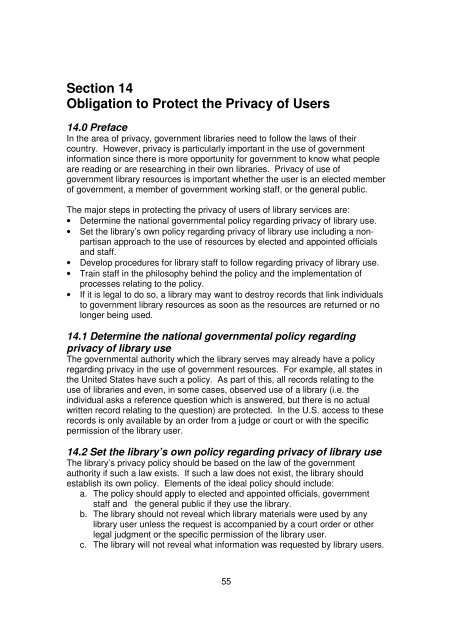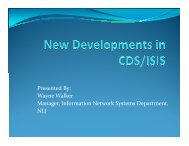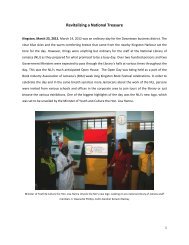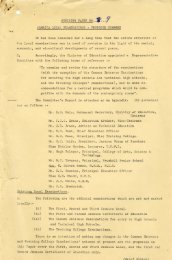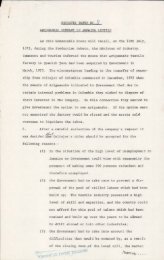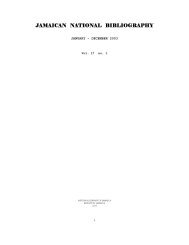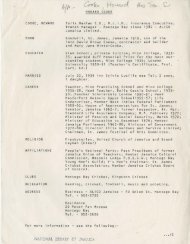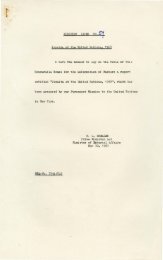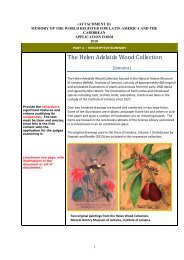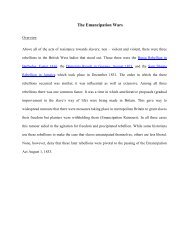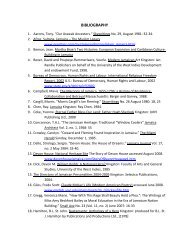Guidelines for Libraries of Government Departments - IFLA
Guidelines for Libraries of Government Departments - IFLA
Guidelines for Libraries of Government Departments - IFLA
Create successful ePaper yourself
Turn your PDF publications into a flip-book with our unique Google optimized e-Paper software.
Section 14<br />
Obligation to Protect the Privacy <strong>of</strong> Users<br />
14.0 Preface<br />
In the area <strong>of</strong> privacy, government libraries need to follow the laws <strong>of</strong> their<br />
country. However, privacy is particularly important in the use <strong>of</strong> government<br />
in<strong>for</strong>mation since there is more opportunity <strong>for</strong> government to know what people<br />
are reading or are researching in their own libraries. Privacy <strong>of</strong> use <strong>of</strong><br />
government library resources is important whether the user is an elected member<br />
<strong>of</strong> government, a member <strong>of</strong> government working staff, or the general public.<br />
The major steps in protecting the privacy <strong>of</strong> users <strong>of</strong> library services are:<br />
• Determine the national governmental policy regarding privacy <strong>of</strong> library use.<br />
• Set the library’s own policy regarding privacy <strong>of</strong> library use including a nonpartisan<br />
approach to the use <strong>of</strong> resources by elected and appointed <strong>of</strong>ficials<br />
and staff.<br />
• Develop procedures <strong>for</strong> library staff to follow regarding privacy <strong>of</strong> library use.<br />
• Train staff in the philosophy behind the policy and the implementation <strong>of</strong><br />
processes relating to the policy.<br />
• If it is legal to do so, a library may want to destroy records that link individuals<br />
to government library resources as soon as the resources are returned or no<br />
longer being used.<br />
14.1 Determine the national governmental policy regarding<br />
privacy <strong>of</strong> library use<br />
The governmental authority which the library serves may already have a policy<br />
regarding privacy in the use <strong>of</strong> government resources. For example, all states in<br />
the United States have such a policy. As part <strong>of</strong> this, all records relating to the<br />
use <strong>of</strong> libraries and even, in some cases, observed use <strong>of</strong> a library (i.e. the<br />
individual asks a reference question which is answered, but there is no actual<br />
written record relating to the question) are protected. In the U.S. access to these<br />
records is only available by an order from a judge or court or with the specific<br />
permission <strong>of</strong> the library user.<br />
14.2 Set the library’s own policy regarding privacy <strong>of</strong> library use<br />
The library’s privacy policy should be based on the law <strong>of</strong> the government<br />
authority if such a law exists. If such a law does not exist, the library should<br />
establish its own policy. Elements <strong>of</strong> the ideal policy should include:<br />
a. The policy should apply to elected and appointed <strong>of</strong>ficials, government<br />
staff and the general public if they use the library.<br />
b. The library should not reveal which library materials were used by any<br />
library user unless the request is accompanied by a court order or other<br />
legal judgment or the specific permission <strong>of</strong> the library user.<br />
c. The library will not reveal what in<strong>for</strong>mation was requested by library users.<br />
55


